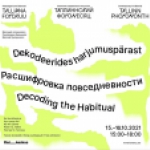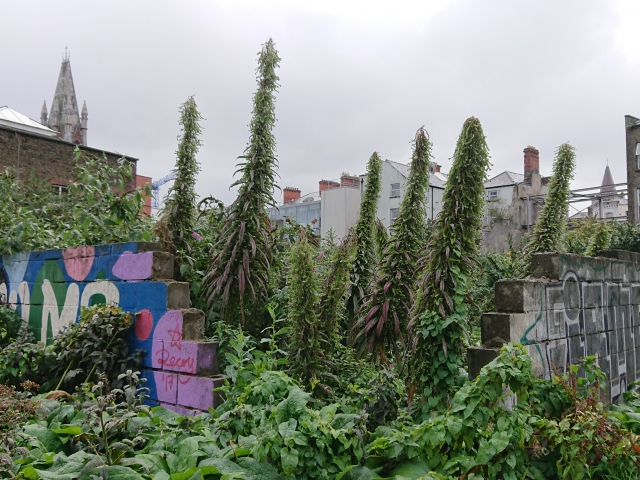- English
- Русский
Decoding the Habitual. Symposium as a part of the 6th Tallinn Photomonth Biennial

DECODING THE HABITUAL
Location: Kai Art Center (Peetri 12, Tallinn) & online (YouTube: TallinnPhotomonth) Time: 15:00–18:00
Symposium speakers: Jasmina Cibic, Tanja Engelberts, Aziza Kadyri, Gareth Kennedy, Daniel McCarthy Clifford, Ingel Vaikla
The symposium of the 6th Tallinn Photomonth expands the conceptual framework of the main biennial exhibition “Intensive Places”. It builds up a set of propositions to stimulate our political imagination in order to divert the reproduction of current societal modes of living towards enhanced solidarity, self-governance, and more empathic coexistence. Such a transformation firstly requires the analysis of biopolitical, economic and social strategies of governmental and corporate control so deeply and seamlessly embedded in our everyday reality that they become naturalized and invisible without deliberate investigation.
The governments of dominant global nations fully practice the “society of control” or society of “free floating control” that has no fixed timeframe or a particular location and is being reproduced by creating “a new subject that is at once a physiological assemblage, a synthetic and electronic assemblage, and a neuro-biological assemblage”. Often presented as mechanisms of maintaining social order and achievements of technological progress, controlling structures affecting our being and relationships with others emerge through the steady work of many elements of social infrastructure - from education to medical industry to cyberspace. Along with raising the question about the necessity to alter the course of humanity development, the pandemic also activated the work of restricting mechanisms and demonstrated how easily and quickly new regulations - often illogical, unnecessary and discriminative - can be implemented and internalized.
At the 2-day event “Decoding the Habitual” we’ll contribute to the scholarship of governmentality, biopolitics and politics of knowledge production in order to map processes stimulated by political technologies and governmental strategies of controlling, maximizing and manipulating lives of different species. Invited symposium speakers are practicing artists and scholars that investigate strategies and tactics of decoding and disclosing the policing mechanisms incorporated into various constituents of the contemporary state including educational and correctional institutions, architecture and urban planning, environmental policies, clothing design and gender construction, digital behavioral patterns, and more. They will present their research of statecraft technologies and share their methods of sharpening spatial literacy and practicing emancipation of our bodies and minds by liberating them from the ways of living and learning that are heavily imposed on us by social structures.
Since the symposium continues the conversation about ‘intensive places’ and analysis of various spaces from the perspective of human activity, we will largely touch upon architecture and design as political technologies and biopolitical strategies mediated through built environments and will discuss experiences and consciousness they are supposed to create. For example, Paul Preciado argues that ignoring the fact that architecture is a multitude of overlapping systems gives governments the possibility to implement their control and power over users of particular architecture structures as well as to practice imposed regimes of specialisation of gender and sexuality. He states, “architecture does not house a (sexual) subject, a gender that already exists, but rather constructs in a performative way this subject that claims to shelter”. During the symposium we will try to answer the questions how to queer the structures that are aimed at organizing our lives and how artistic practices can help us find and create loopholes in the predetermined social reality and its cobstructed elements?
In her research about the tradition and history of gender construction incorporated into clothing design, artist Aziza Kadyri is looking for gaps and connections between the garment, its wearer and surrounding architecture. She also traces the history of reinforcement of gender norms and divisions through clothes and transformation of female garments into tools of oppression. Together with participants of her project “De-canon” Aziza is working on an emancipatory wearable outfit that will serve an individual's sexuality and bodily needs. Tanja Engelberts will also address different functions and representations of cover - relying on her research of waste management, she will unveil mechanisms of creating artificial natural structures to hide the aftermath of our industrial present and what it might mean for our future.
Daniel McCarthy Clifford will speak about manipulated access to information commenting on polishing knowledge from confrontational facts and censorship in US prisons as well as discussing the current trend in US politics to place restrictions on public school curriculum (particularly histories of civil rights and political activism). Artist and educator Gareth Kennedy will reflect upon the need to look for alternative ways and places of education during the pandemic. Taking his classes outdoors turned them into an immersive and environmental learning experience for his students and himself, which helped them (re)interpret the world around them as well as challenged the hierarchical approach to learning determined by traditional architecture of educational spaces. Jasmina Cibic will also focus on the relations between architecture and knowledge, exploring how art and architecture are used to service the ideological ambitions of the state through ‘enacted’ exercise in the dissection of statecraft, drawing together primary archival sources, reconfigurations of political rhetoric and ideologically tainted architectural spaces. Looking at how the contemporary youth deal with the remnants of the utopian ruins incorporated into Soviet architecture and city planning, Ingel Vaikla will examine whether ideology can travel through generations and how memory about it transforms through accumulated layers of collective memory.
As Deleuze says, “there is no need to fear or hope, but only to look for new weapons”. Along with this urge, there is a need for new types of experimental research and investigations, new channels of knowledge distribution and shared understanding of the processes of decolonizing history and current political reality. Therefore, the symposium will be a ground for collective development of a set of analytical parameters for spatial and infrastructure literacy aiming to identify hidden powerful structures, bureaucratic and legal regulations that police and govern our lives. The presentations of invited speakers will look at architecture beyond buildings and at design beyond production to expand our knowledge about common cultural and political history and contemporary controlling strategies that are daily getting more complex and escape our perception. We need to execute transparency and publicly discuss the growing pressure exercised on our bodies and thoughts in order to maintain a more sustainable, happier, freer and meaningful future existence.
The Symposium at the 6th Tallinn Photomonth biennial continues the TOK Symposium project. The first Symposium "Transcending Realities, Overcoming Borders and Creating Structures'' was a part of the 1st Curatorial Forum organized by NCCA St Petersburg in 2019 and the second Symposium “Interdependency as a Condition” was held in conjunction with the IV Arctic Art Forum “Ecologies of the Invisible” organized by the Arctic Art Institute in 2020. TOK Symposium is a nomadic project that annually lands on different international art events and serves as a platform for open discussions between artists, curators, scholars and wide audiences.
SYMPOSIUM SCHEDULE (Eastern European summer time GMT+2)
DAY 1, October 15: Statecraft Technologies
15.00 - 15.10 Welcome words by the directors of the 6th Tallinn Photomonth Kulla Laas and Merilin Talumaa and representatives of Kai Art Center
15.10 - 15.20 Introduction words by TOK about the theme of the symposium, its connection to the exhibition “Intensive Places”, about speakers, overall schedule and the format of the 2-day event
15.20 - 16.00 Jasmina Cibic, "Let Concrete Thoughts Freely Pour"
16.00 - 16.40 Ingel Vaikla, "On Second Hand Memories" (presentation includes a video screening of Ingel’s work "Double Exposure", 13 min)
16.40 - 17.00 Break
17.00 - 17.40 Daniel McCarthy Clifford
17.40 - 18.00 Q&A and wrap-up of the session
DAY 2, October 16: Spatial and Bodily Literacy and Practices of Freedom
15.00 - 15.10 Introduction words by TOK about the speakers and schedule of the 2nd day of the symposium
15.10 - 15.50 Gareth Kennedy, "FIELD work: Evolving Naturecultures in Inner city Dublin"
15.50 - 16.30 Tanja Engelberts, "Exploring the 'Hollow': Hidden Structures of Artificial Natural and Industrial Landscape"
16.30 - 16.50 Break
16.50 - 17.30 Aziza Kadyri, “Body-Gap-Garment-Gap-Room”
17.30 - 18.00 Open discussion, Q&A
The Symposium will be streamed via Tallinn Photomonth Youtube channel



